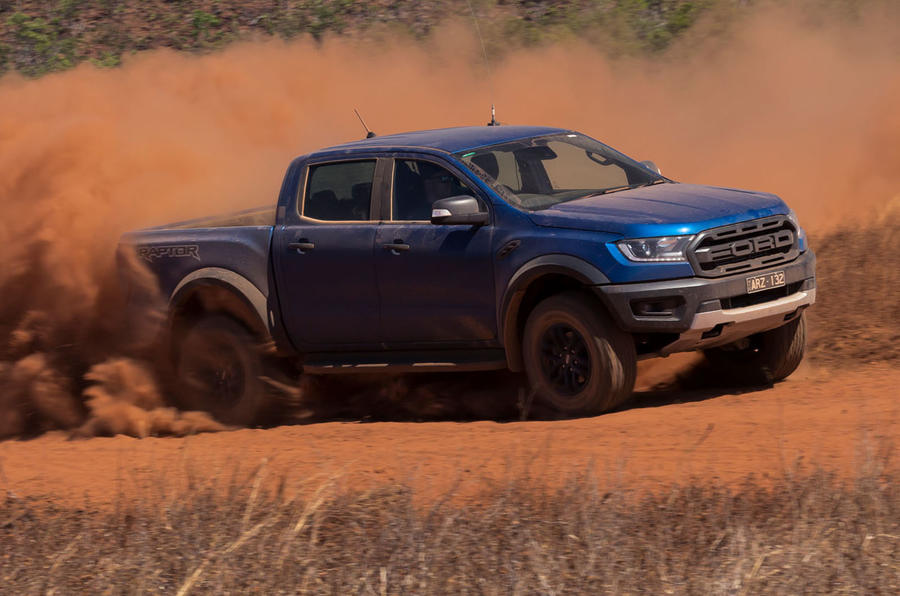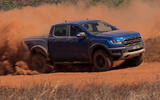What is it?
Can there really be such a thing as a performance pick-up truck? We’re driving the new Ford Ranger Raptor in the Aussie outback to find out.
It’s not the geographical centre of Australia, but it may as well be, so far away are we from civilisation – about 160 miles south of Darwin, in the Northern Territory. Uluru, also known as Ayers Rock, is another 1000 miles or so further south.
For this media preview drive, Ford has shacked up at a privately owned cattle station that stretches more than 1500 square miles. It’s so huge it has its own school, while the owner uses a helicopter to round up the 30,000 cattle and occasionally check on the vast perimeter. Clearly, Ford wanted to prove the Ranger Raptor is no pretender, so it ventured into the harshest terrain it could muster.
The US has been toying with performance pick-ups for the past decade, with the F-150 Raptor, inspired by desert racers. After mixed success with the drag strip-focused supercharged F-150 Lightning in the late 1990s, Ford finally found the sweet spot with buyers favouring a high-powered truck with decent off-road ability.
The formula is simple: fit heavy-duty shock absorbers, a wider track and nobbly all-terrain tyres to a pick-up with extra grunt under the bonnet. Customers quickly discovered the same suspension that irons out rough tracks also creates a smoother ride in the concrete jungle – the best of both worlds.
Now, the Raptor formula is being shared around the world, using the Ford Ranger as the donor vehicle – and it’s coming to the UK. The Ranger, for those who don't know, is the smaller sibling to the F-150 and serves as Ford’s rival to the Toyota Hilux and Volkswagen Amarok.
The Ranger Raptor’s ingredients are familiar. It gets a bold new grille, tucked front and rear bumpers for better off-road clearance, a 150mm-wider track, bulging front and rear fenders, magnesium side steps, race-bred Fox shocks and gnarly BF Goodrich K02 tyres, which are arguably the best in the business.
Ford says the shocks have been tested to manufacturer standards and should last at least 100,000 miles with normal use. Drive it like they do in the promotional video and you might need to replace them sooner than that.
The Raptor still comes with selectable heavy-duty four-wheel drive hardware with low and high range, so it can only be driven in two-wheel drive mode on Tarmac. In contrast, the four-wheel-drive-only Volkswagen Amarok TDV6 and Mercedes-Benz X-Class TDV6 can handle sealed pavement without dire consequences.
The Ranger Raptor isn't just a jacked-up pick-up; it has a unique chassis. It’s effectively a stretched Everest SUV four-wheel-drive platform, so the rear end has coil suspension rather than leaf springs. It will be next to impossible for lads to create a cheap copycat.
The interior has been given a lift courtesy of Raptor logos stitched into the suede-and-leather sports seats; a chunky, leather-wrapped steering wheel with magnesium, rather than plastic, paddle shifters; blue stitching on the dashboard; and unique instruments and scuff plates.
Unlike the American F-150 Raptor, which has offered V8 and turbocharged V6 petrol power over its first two generations, the Ranger Raptor is powered exclusively by a 2.0-litre twin-turbocharged four-cylinder diesel unit that has been boosted to pump out 210bhp and 369lb ft. That compares with 197bhp and 347lb ft for the 3.2-litre five-cylinder diesel in the regular Ford Ranger.




























Join the debate
Add your comment
I can't believe they didn't see it before they got started.
My cousin has a range roger
My cousin has a range roger. Its powerful engine and nice design pixel gun 3d
3.0 V6
Wait for the 3.0 V6 disel-engined Ranger coming in 2020 or thereabouts.